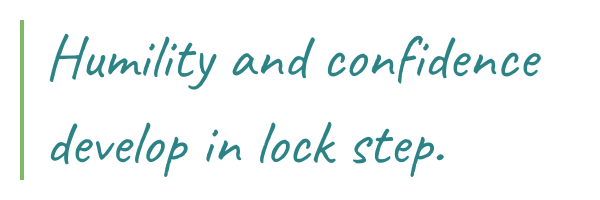Gain Confidence with these Three Questions
I had a client years ago for whom knowledge was an important value (they were an Enneagram type 5, for those of you out there who are Enneagram fans). We had a coaching session centered on the topic of confidence.
I asked this client what confidence meant to them. After exploring, they realized that it meant "knowing the answer." That could mean knowing the next step, knowing what to say, or knowing what they wanted.
In that powerful coaching session, we were able to reframe this leader's conception of confidence, to something much more useful and less hamstringing. Their confidence level, they discovered, was actually tied to their ability to figure something out. And they deeply trusted that ability in themselves. Now, confidence was no longer something that was predetermined in any situation; they could actually cultivate it through learning. That was a much more empowered place to be.
The word confidence comes from the Latin word confidere. The prefix con- usually means "with," but here it is an 'intensive' prefix, meaning "completely.” Then, "fidere" is a verb meaning "to trust." So confidence breaks down to mean "to trust completely." (source: dictionary.com)
Who are we trusting completely when we have confidence? Why, ourselves, of course.
Here are three questions to ask yourself to assess and increase your confidence now.
1. Do I trust myself to show up?
In our anxiety-driven fantasies, we might imagine hitting the eject button right out of hard situations. Showing up is half the challenge. Consider working on the ways you could show up more fully. Maybe it's showing up to work on something that is technically challenging. Maybe it's showing up to a difficult conversation with full presence. Maybe it's showing up to prepare well for a big performance.
2. Do I trust myself to respond to whatever arises?
It's easy to fear the unpredictable—What questions will audience members at my talk ask? What will my boss say when I deliver this report? If you can trust your ability to respond to the unpredictable, then you'll feel more confident. What works for me is to prepare a key ’backstop’ phrase like "Let me think about that and circle back with you" that I can confidently deliver even when I feel unsure. This is an important point: you can, with a confident tone, effectively say “I don’t know but I will work to figure it out.” Isn’t that great?!
3. Do I trust myself to be humble when needed?
If you work on the above two points, you're inevitably going to notice areas where you want to grow. Humbly take that in. Have a moment of raw honesty with yourself that is soaked in kindness. Your ability to not be afraid of the ways you fall short of your ideal self will actually increase your confidence. Humility and confidence develop in lock step.
Showing up, seeing yourself as response-able, and humbly embracing the inherent feedback loop that this creates will deepen your confidence starting today.
If the answer is a hard 'no' to any of the questions above, you may need more support than you are currently getting. If the answer is some sort of yes, even small, then you are off to a good start in increasing your confidence.


